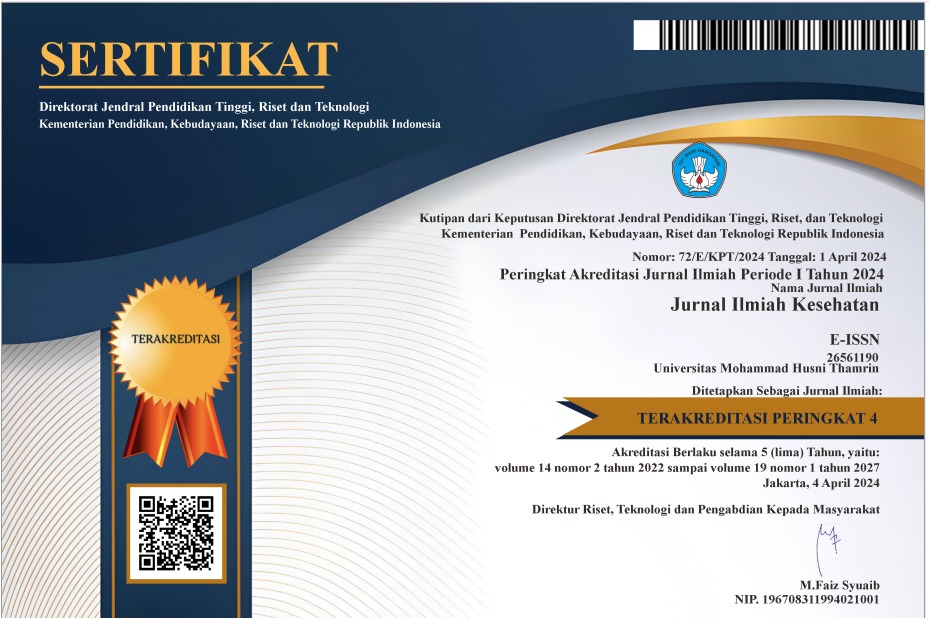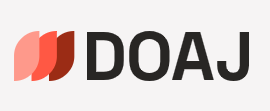Peran Keterlibatan Suami Melalui Pengetahuan, Jumlah Anak dan Dukungan dalam Keberhasilan Pemberian ASI Eksklusif
DOI:
https://doi.org/10.37012/jik.v16i2.2611Keywords:
Exclusive breastfeeding, Husband’s Support, Parity, Husband's Knowledge levelAbstract
Exclusive breastfeeding during the first six months of an infant’s life offers significant benefits for both the infant and mother. However, the coverage of exclusive breastfeeding in Indonesia remains below the national target. This study aimed to analyze the relationship between husbands' knowledge level, number of children, and husbands' support with exclusive breastfeeding practices in the working area of Puskesmas Pasar Rebo, East Jakarta. A cross-sectional design was used involving 52 respondents selected through one-stage cluster sampling. Data were collected using a structured questionnaire and analyzed using the chi-square test. Results showed that only 32.7% of mothers practiced exclusive breastfeeding. As many as 59.6% of husbands had poor knowledge, and 65.4% of breastfeeding mothers did not receive adequate support from their husbands. There were significant relationships between husbands’ knowledge (p = 0.001), number of children (p = 0.002), and husbands’ support (p = 0.001) with exclusive breastfeeding practices. These findings highlight the crucial role of husbands in breastfeeding success. Therefore, family-based interventions that enhance husbands’ knowledge and involvement are essential to improve exclusive breastfeeding coverage and support the achievement of national child health goal.
References
Agrawal, J., Chakole, S., & Sachdev, C. (2022). The Role of Fathers in Promoting Exclusive Breastfeeding. Cureus. https://doi.org/10.7759/cureus.30363
Ballesta-Castillejos, A., Gómez-Salgado, J., Rodríguez-Almagro, J., Ortiz-Esquinas, I., & Hernández-Martínez, A. (2020). Factors that influence mothers’ prenatal decision to breastfeed in Spain. International Breastfeeding Journal, 15(1). https://doi.org/10.1186/s13006-020-00341-5
Gayatri, M. (2021). Exclusive Breastfeeding Practice in Indonesia: A Population-Based Study. Korean Journal of Family Medicine, 42(5), 395–402. https://doi.org/10.4082/kjfm.20.0131
Grenholm, E. A., Söderström, P., & Lindberg, B. (2021). Providing Breastfeeding Support: Experiences from Child-Health Nurses. International Journal of Child Health and Nutrition, 5(4). https://doi.org/10.6000/1929-4247.2016.05.04.1
Idris, H., & Astari, D. W. (2023). The practice of exclusive breastfeeding by region in Indonesia. Public Health, 217. https://doi.org/10.1016/j.puhe.2023.02.002
Jama, A., Gebreyesus, H., Wubayehu, T., Gebregyorgis, T., Teweldemedhin, M., Berhe, T., & Berhe, N. (2020). Exclusive breastfeeding for the first six months of life and its associated factors among children age 6-24 months in Burao district, Somaliland. International Breastfeeding Journal, 15(1). https://doi.org/10.1186/s13006-020-0252-7
Kapti, R. E., Arief, Y. S., & Azizah, N. (2023). Mother’s knowledge as a dominant factor for the success of exclusive breastfeeding in Indonesia. Healthcare in Low-Resource Settings, 11(S1). https://doi.org/10.4081/hls.2023.11209
Kemenkes RI. (2022). Profil Kesehatan Indonesia 2021. In Pusdatin.Kemenkes.Go.Id.
Kusumahati, G. S., & Novera Herdiani. (2023). The Relationship of Exclusive Breastfeeding to Stunting in Toddlers in Jambangan District, Surabaya, Indonesia. Community Medicine and Education Journal, 4(1). https://doi.org/10.37275/cmej.v4i1.305
Llorente-Pulido, S., Custodio, E., López-Giménez, M. R., Sanz-Barbero, B., & Otero-García, L. (2021). Barriers and facilitators for exclusive breastfeeding in women’s biopsychosocial spheres according to primary care midwives in tenerife (Canary islands, Spain). International Journal of Environmental Research and Public Health, 18(7). https://doi.org/10.3390/ijerph18073819
Mamoh, M. O., Gunarmi, G., & Kristiarini, J. J. (2023). The Effect of Husband Support and Economic Status Level on Exclusive Breastfeeding. Jurnal Ilmiah Kesehatan Sandi Husada, 12(2). https://doi.org/10.35816/jiskh.v12i2.1111
National Institute for Health and Care, & Excellence. (2021). Postnatal Care: Breastfeeding facilitators and barriers. NICE Guideline NG194.
Nurokhmah, S., Rahmawaty, S., & Puspitasari, D. I. (2022). Determinants of Optimal Breastfeeding Practices in Indonesia: Findings From the 2017 Indonesia Demographic Health Survey. Journal of Preventive Medicine and Public Health, 55(2). https://doi.org/10.3961/jpmph.21.448
Ouyang, Y. Q., & Nasrin, L. (2021). Father’s knowledge, attitude and support to mother’s exclusive breastfeeding practices in bangladesh: A multi-group structural equations model analysis. Healthcare (Switzerland), 9(3). https://doi.org/10.3390/healthcare9030276
Pakilaran, G., Rasni, H., Rosyidi Muhammad Nur, K., & Wijaya, D. (2022). Family Support on Exclusive Breastfeeding in Babies Aged 0-6 Months in Indonesia: Literature Review. Nursing and Health Sciences Journal (NHSJ), 2(2). https://doi.org/10.53713/nhs.v2i2.53
Phua, H. W., Razak, N. A. A. A., & Mohd Shukri, N. H. (2020). Associations of father’s breastfeeding attitude and support with the duration of exclusive breastfeeding among first-time mothers. Malaysian Journal of Medicine and Health Sciences, 16.
Prasetyo, Y. B., Rahayu, H. T., Kurnia, A. D., Masruroh, N. L., Melizza, N., & Latif, R. A. (2023). Breastfeeding Trends and it’s Related Factors in Indonesia: A National Survey. Jurnal Gizi Dan Pangan, 18(1), 31–40. https://doi.org/10.25182/jgp.2023.18.1.31-40
Umrana, S., Abadi, E., Waluyo, D., & Nasution, A. S. (2023). Father’s involvement in the success of exclusive breastfeeding. AcTion: Aceh Nutrition Journal, 8(3). https://doi.org/10.30867/action.v8i3.1038
Widiantoro, R., Khairunnisa1, K., Furqon, M. F. M., Murti, B., & Handayani, A. F. (2024). Effects of Husband Support, Family Income, Employed Mothers, and Antenatal Care Visit on Exclusive Breastfeeding. Journal of Maternal and Child Health, 9(1). https://doi.org/10.26911/thejmch.2024.09.01.06
Downloads
Published
How to Cite
Issue
Section
Citation Check
License
Copyright (c) 2025 Rahmi Andrita Yuda

This work is licensed under a Creative Commons Attribution 4.0 International License.
Jurnal Ilmiah Kesehatan allows readers to read, download, copy, distribute, print, search, or link to the full texts of its articles and allow readers to use them for any other lawful purpose. The journal allows the author(s) to hold the copyright without restrictions. Finally, the journal allows the author(s) to retain publishing rights without restrictions Authors are allowed to archive their submitted article in an open access repository Authors are allowed to archive the final published article in an open access repository with an acknowledgment of its initial publication in this journal.

Lisensi Creative Commons Atribusi 4.0 Internasional.










